Thesaurus : Doctrine

► Référence complète : A. Cheng, "Il ne peut y avoir deux soleils dans le ciel, ni deux princes pour un pays » : despotisme et monisme en Chine", Cours au Collège de France, 2024.
Il s'agit de partir de la phrase de Montesquieu qui affirme que la Chine est un régime despotique dont le principe est la crainte et de la confronter à la Chine d'hier et d'aujourd'hui.
____
____
► Cours successifs :
🎥Questions de traduction (1), 14 novembre 2024
Montesquieu "a commencé par parler japonais", le Japon moderne ayant été marqué par L'esprit des lois, la notion de despotisme et la notion de séparation des pouvoirs s'introduisant par la traduction en japonais et en chinois, notions qui étaient totalement inédites, dans des cultures confucéennes. A cette aune et selon des auteurs japonais réformateurs, le Japon peut apparaître comme un espace "constitutionnel" tandis que la Chine apparaît comme un espace despotique. Un autre auteur japonais traduit en distinguant le régime monarchique, le régime aristocratique et la république. Le despote est alors celui qui règne seul et sans limite de son pouvoir, la qualification visant la dérive monarchique, mais l'auteur n'en conclut pas à la séparation des pouvoirs. Des manuels scolaires japonais s'approprient la pensée de Montesquieu et présentent la Chine comm despotique. C'est le gouvernement Meiji qui 2 ans plus tard propose la séparation des pouvoirs législatif, exécutif et judiciaire. Des conférences savantes à Tokyo se réfèrent à Montesquieu et sa théorie de la séparation de 3 pouvoirs indépendants pour éviter le despotisme mais souligne que ce sont les Etats-Unis qui seuls l'appliquent.
🎥Questions de traduction (2) 21 novembre 2024🎥La faute à Montesquieu 28 novembre 2024🎥La rupture moderniste et libérale 5 décembre 2024🎥Pensée minben (primauté du peuple) contre despotisme 12 décembre 2024🎥Réfutation de la pensée minben 19 décembre 2024🎥Ni deux soleils, ni deux princes 9 janvier 2025🎥Un seul Dao holiste et moniste 16 janvier 2025🎥Le culte du Grand Un 23 janvier 2025
_______
Oct. 15, 2025
Thesaurus : Soft Law
► Référence complète : Speech of HE Judge Iwasawa Yuji, President of the International Court of Justice, before the Sixth Committee of the United Nations General Assembly, 15 octobre 2025
____
📝Lire la prise de parole (en anglais)
____
► Résumé de la prise de parole : L
________
April 8, 2025
Conferences
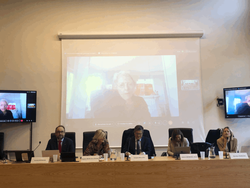
🌐suivre Marie-Anne Frison-Roche sur LinkedIn
🌐s'abonner à la Newsletter MAFR Regulation, Compliance, Law
🌐s'abonner à la Newsletter en vidéo MAFR Surplomb
🌐s'abonner à la Newsletter MaFR Droit & Art
____
► Référence complète : M.-A. Frison-Roche, "Traduire dans l'institution judiciaire l'articulation entre l'international et le systémique" in CREDIP, Faculté de Droit de l'Université Jean Moulin - Lyon 3, Le contentieux systémique émergent, un contentieux international justifiant la création de juridictions spécialisées, cycle de conférences sur Le contentieux international et la spécialisation des juges, Lyon , 18 avril 2025, 10h-12h.
____
🪑🪑🪑Participent aussi à cette manifestation :
🪑Jacques Boulard, Premier président de la Cour d'appel de Paris
🪑Brigitte Brun-Lallemand, Première présidente de chambre de la Cour d'appel de Paris (Pôle économique)
🪑Jérémy Heymann, professeur de droit à l'Université Jean Moulin - Lyon 3
🪑Sabine Abravanel-Jolly, Professeure de droit au sein de l'Equipe Louis Josserand
🪑Marylou Françoise, maîtresse de conférences à l'Université Jean Moulin - Lyon 3
____
🧮consulter le programme complet de cette manifestation
____
► Résumé de l'intervention : cette intervention ayant eu lieu après les présentations du Premier Président Jacques Boulard et Madame la Première Présidente Brigitte Brun-Lallemand, elle s'articule sur ces deux interventions.
I. Contentieux systémique et Contentieux international. On peut ainsi se demander si la nature d'un "contentieux systémique" se prête à ce qu'est un "contentieux international" ? A première vue, non. L'on pourrait poser que, d'une part, si le "contentieux systémique émergent" était "nécessairement international", alors l'on ne comprendrait pas pourquoi la Chambre spéciale internationale de la Cour d'appel de Paris ne suffisait pas et d'autre part, l'on ne comprendrait pas comment deux jugements ont été rendus sur le Devoir de Vigilance, dont on ne conteste pas qu'il appartient au Contentieux Systémique Emergent, alors qu'ils ne portent pas sur une chaine internationale de valeur : jugement TJ Paris 5 décembre 2023 dit La Poste, cas systémique actuellement devant la chambre spécialisée de la Cour d'appel de Paris ; TJ Paris 13 février 2025, dit SNCF, cas systémique, n'ayant pas fait l'objet d'appel.
II. Deux chambres spécialisées en miroir Dès lors, l'on pourrait dire que le contentieux systémique est de fait international mais pas par nature. Parce que cela n'est pas une subdivision du contentieux international, cela explique certes que la chambre 5-12 soit autonome par rapport à la chambre 5-16 (chambre internationale), mais parce que la perspective est de fait souvent transnationale, ces 2 chambres ont vocation à fonctionner en miroir. Car le système est un fait global. Et c'est plus en terme de fait global qu'il convient de le traiter, ce qui est plus facile dans des systèmes qui ne sont pas construit sur cette summa divisio du fait et du droit, qui convient mal au contentieux systémique.
III. Par nature, un contentieux dans lequel un système est "impliqué". Cela nous amène donc vers la définition du "Contentieux Systémique Emergent". Elle est simple : c'est un Cause dans laquelle un système est impliqué, dans lequel les intérêts de celui-ci sont en jeu, le premier de ses intérêts étant sa survie. C'est pourquoi la durabilité est une notion-clé, que l'on retrouve quelque soit le système impliqué. C'est pourquoi l'avenir est présent dans le contentieux systémique. C'est pourquoi l'office du juge est renouvelé car il s'agit d'un office Ex Ante, renouvellement à la fois procédural et substantiel qui conduit en pratique à un Droit processuel. Le fait systémique mène donc de droit à une dialogue des juges qui se spécialisent sur des faits globaux et les obligent, sauf à méconnaître ceux-ci, à se prendre en considération. Cela donne un nouveau statut au "droit comparé".
IV. Un contentieux émergent par le fait de systèmes nouveaux, globaux, saisis par des opérateurs locaux qui en fixent la stratégie. Les systèmes ont déjà donné lieu à des contentieux : c'est la juridictionnalisation du Droit de la Régulation. Mais la Régulation a quitté ce prérequis des systèmes pour entrer à l'intérieur des opérateurs économiques dont le pouvoir de stratégie est situé localement. Le Droit de la Compliance internalise les besoins systémiques. Le Droit de la Compliance dont on affirma, parce qu'Ex Ante, qu'il allait dispenser du Juge, s'est lui-même juridictionnalisé. L'obligation de vigilance étant elle-même la pointe avancée de la Compliance, ne pouvait que donner une large place au Juge. Tandis que le système est l'enjeu du procès et de sa bonne solution, la partie au litige est l'opérateur cruciale : non seulement les entreprises régulées (comme les banques) mais encore les entreprises maîtresses des chaines de valeur (ce qui fait sortir le Droit de la Régulation des secteurs régulés). Or, les chaines de valeur sont un espace global contractuellement structuré transnational rattachées à un juge local qui est confronté à un office renouvelé avec le DIP.
V. Une culture juridictionnelle propre à des zones distinctes. Le Droit de la Vigilance, de la Compliance et de la Régulation tel qu'on le voit manier par les juges dépasse nos distinctions entre droit public et droit privé, entre les systèmes juridique, mais les décisions que l'on lit expriment trois cultures, procédurales et substantielles, différentes : l'Asie, les Etats-Unis et l'Europe. Cette culture de place porteuse d'une identité européenne de Vigilance, de Compliance et de Régulation repose notamment sur une culture juridictionnelle propre à cette zone-là.
________
March 11, 2025
Conferences

🌐follow Marie-Anne Frison-Roche sur LinkedIn
🌐subscribe to the Newsletter MAFR Regulation, Compliance, Law
🌐subscribe to the Video Newslette MAFR Surplomb
____
► Full Reference : M.-A. Frison-Roche, "Le juriste, requis et bien placé pour le futur" (The lawyer needed and well placed for the future), in Groupe Lamy Liaisons, Les Éclaireurs du Droit, Hôtel de l’Industrie, Place Saint Germain des Près, Paris, 11 March 2025, 16h.
____
This speech opens a series of 4 workshops on the following themes:
- The challenge of Trust
- The challenge of Risk
- The challenge of Transmission
- The challenge of leadership
____
🧮see the full programme of this manifestation (in French)
____
⬜see the slides basis made for this speech (which were not projected) (in French)
____
🎥 watch the short video made after the conference (in French)
____
► English Summary of this introductory conference: The 4 sessions will address the successive themes of trust, risk, transmission and leadership, which legal professionals are facing, particularly as a result of algorithms.
For an introductory analysis, it is possible to make a distinction inside the Future.
The future has a part of Stability: the jurist can contribute to this stability, i.e. the preservation of the past (I).
The future has an part of Predictability: the lawyer must increase this part in the present itself (II).
The future has a part of radical novelty (III): at this point, which may correspond to a precipice, if no one had imagined it, the lawyer can also be there. Until now, we think of lawyers more in the first 2 hypotheses, less in this one. Is it pertinent?
In each of these dimensions, the algorithmic system (AI) is presented as replacing or dominating the human.
In each of these 3 dimensions, Lawyers must be present, as they form a community that must remain united around the very idea of Law (algorithms do not conceive ideas, it is humans who transmit them to other humans, and the algorithmic system must remain a medium).
As far as the Stability of the future is concerned, the Lawyer can and must contribute to it, in particular through Transmission, because there is less of a blank page as algorithmic 'creation' is based on past data, and training, where the human being will be all the more central as machines have to be handled.
As far as the Predictability of the future is concerned, it is a question of assessing the Risks, whether specific or systemic, legal or non-legal, in order not to take them or on the contrary to take them. The more the Lawyer is involved in risk-taking, the more he or she will be in the right place, before and during the action.
As far as the Radically New future is concerned, it is not easy to qualify AI as such or not, but now the possible disappearance of the Rule of Law in the United States is one of them. All Lawyer are expected. Every lawyer must have two virtues (which the algorithm cannot not have): the virtue of Justice and the virtue of Courage. It is these virtues that we must pass on and share.
____
Current events have led me to devote the time available to me to focusing on a single perspective, the third, to say what is expected of Lawyers if we perceive something radically new in the near future, what everyone does.
Indeed, in the United States, on the one hand there is a head of state for whom the Law does not exist and who uses the power of regulation to express his absolute indifference to other states, companies and human beings, and on the other an entrepreneur who claims that he is going to become the master of algorithmic technology, a system over which he already wields great power.
Faced with this Radical Novelty, we expect the community of Lawyers, all lawyers, whatever their place, their technical mastery, their level, their nationality, to speak out and say No. As Kelsen, Cassin or Ginsberg did. Say No and help others to say No. To do this, Lawyers, as human beings who care about other human beings, must be aware of the twofold virtue expected of them: the virtue of commitment to Justice and the virtue of Courage.
________
Nov. 15, 2024
Conferences
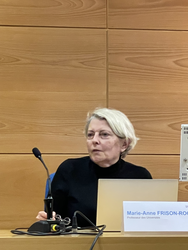
🌐follow Marie-Anne Frison-Roche on LinkedIn
🌐subscribe to the Newsletter MAFR Regulation, Compliance, Law
🌐subscribe to the Newsletter Surplomb, par MAFR
____
► Full Reference: M.-A. Frison-Roche, "Considérer la géographie pour réussir le Devoir de Vigilance" ("Taking Geography into account for a successful Vigilance Duty"), concluding speech in Devoir de vigilance, quelles perspectives africaines ? Regards croisés en droit international, droit comparé et droit OHADA (Vigilance Duty : what African perspectives? Cross-analysis of International Law, Comparative Law and OHADA Law), Institut de Recherche en Droit des Affaires et du Patrimoine (IRDAP), Bordeaux, 15 November 2024.
____
🧮see the full programme of this manifestation (in French)
____
► English summary of this concluding speech: This concluding speech was made "on the bench", i.e. directly after listening to all the day's speakers. It is not, therefore, based on an a priori conception of the subject, but on the impression that emerged from the whole, as one speaker followed another.
The general impression is that these compliance instruments, of which the vigilance tool is the spurred head, are only appropriate if they fulfill the purpose for which they were devised and imposed, which presupposes that they are appropriate to the concrete situations to which they apply: to the country, to the legislation that shapes and expresses this country, to its economy, to its population.
There is certainly room for improvement. But Vigilance legal instruments, like Compliance Law, are new mechanisms that are in the process of taking shape: we must seek to improve them and find solutions:
🧱🕴🏻mafr, 🚧Duty of Vigilance: the way forward, 2024
This is not easy, especially if we get lost in the jigsaw puzzle of texts and decisions in which the vigilance technique fits, particularly at French, European and international level:
🧱🕴🏻mafr, 🚧Vigilance, a piece of the European puzzle, 2023
Listening to all the many and varied speakers, it is clear that progress needs to be made to ensure that the Vigilance instrument takes greater account of the concrete situations reflected in the various legal systems of African countries, and in particular the unified OHADA legal system.
It can be done, as long as everyone is willing to bear it in mind.
🧱🕴🏻J.-B. Racine, 📝Geographical dominance in the choice and the use of compliance tools. Introductory remarks, in 🧱🕴🏻mafr (ed.), 📘Compliance Tools, 2021
The speakers demonstrated that the good feelings of Paris or Brussels can pave the way for African hell, for example when about the children labour. The same is true of the fight against corruption, as Mohamed Salah showed.
🧱🕴🏻M.M. Salah ,📝Conception and Application of Compliance in Africa, in 🧱🕴🏻mafr (ed.), 📘Compliance Tools, 2021
____
Meanwhile, listening to each other, it appears that often, despite using the same words, the speakers were not talking about the same thing, particularly not in terms of what the very term "Vigilance" refers to, the difference between the French and English being a challenge because "due diligences" are not the same than Vigilance duty . This is a sign that what we call a duty, or an obligation, or a spontaneous commitment, or a legal order criminally sanctioned, which are not at all the same thing, shows the immaturity of this notion of "Vigilance". What's more, we sometimes talk about the climate, or human rights, or the need to fight corruption or money laundering. These latter concerns are undoubtedly covered by texts classified under Compliance Law, some of which assert that Vigilance is the cutting edge, while others claim that Compliance is alien to or merely a component of Vigilance, because Vigilance embraces ethics, while Compliance is merely obedience to the norm ('conformity').
It is clear that the absence of an agreement on definitions is a handicap in practice, as we do not know which legal regime will apply. This uncertainty is problematic in practice because the regulations don't lay down definitions which alone make it possible to deduce the outline of the obligations of each party, particularly not those of the companies, which ask for instructions for use. Companies receive contradictory interpretations for the same situation, depending on who you are dealing with (a regulator or an NGO for example) or depending on the text (a text specific to the industrial activity, a text specific to the country, or a text from the country of the ordering company on the duty of vigilance, or a text from ordinary contract law or a text that will come from a soft law that remains rather mysterious).
This uncertainty feeds the passion that surrounds the issue of vigilance, with everyone speaking out, the specialists who want to talk about it being suspected of being a technocrat or captured, and those who don't speak out being the local population for whom others speak out.
As a result, two phenomena are set to persist, which we had hardly anticipated but which are set to increase: the contractualisation of all vigilance mechanisms and the jurisdictionalisation of all vigilance organisation.
____
The first phenomenon is the contracting of Vigilance. This contractualisation is the means by which companies have been carrying out their legal compliance obligations for years, using a contractual art that is becoming increasingly sophisticated.
We have very little information on these contracts, which are nonetheless what allow companies to obey the regulations and also to add to them, a combination of obedience and contractual freedom, the effects of which in practice have not yet been fully measured.
🧱🕴🏻mafr, 🚧Will, Heart and Calculation, the Three Traits Encercling the Compliance Obligation, 2024
🧱🕴🏻mafr (ed.), 📘Compliance and Contract, 2025
But they do raise essential questions. Firstly, they will bring back the jurisdiction of general courts , for example the commercial courts (tribunaux de commerce) in France, and the courts of the countries where the industrial operations take place: moreover, they are the natural route to international arbitration. They are a new type of contract, since they structure "value chains" (a managerial concept).
🧱🕴🏻mafr, 🚧Compliance Contract, Compliance Clauses, 2022
There are two key issues concerning these contracts: they directly concern African countries, their economic activity and their populations, as described throughout all the speeches.
The first is to know who governs the structural apparatus constituted by these 'regulatory contracts' through which chains of activity are built as durable structures. Who is strong and who is weak, between companies and states?
The second is to find out how much of the reality of the country and of local economic activity is taken into account by the subsidiary, and how much consideration is given to the local people involved: are the people who are actually involved really "taken into consideration" when we speak for them? Who is best placed to speak on their behalf, to defend them, to get to know them?
If we want to contextualise, refine and get to know the situation as closely as possible, in other words if we want to have definitions so that we know what we are talking about, but at the same time start from geographical and human realities, then it is the Judge who appears because the court starts from the facts.
____
This is the second phenomenon that has emerged and is set to increase: the jurisdictionalisation of Vigilance.
🧱🕴🏻mafr (ed.), 📘Compliance Jurisdictionalisation, 2023
This is understandable, since the judge is able to take cognisance of the facts, the situation in Uganda or Tanzania, and what is often referred to as the "extraterritoriality" of the Compliance mechanisms being thus compensated for.
However, the exclusive jurisdiction of the Paris Court of First Instance (decided in France by a 2021 law) may become more difficult, as it is even further away from Africa than the ordering company is. But it is precisely the contract judges who can be called upon to rule on the basis of Contract Law.
This central role of the judge raises a number of procedural difficulties that have either not yet been resolved, moreover are not still being perceive
🧱🕴🏻mafr (dir.), 🧮Le Droit processuel de la Vigilance (Vigilance Genreral Procedural Law), 2024
At the interface between procedure and substance, evidentiary issues require the development of a new evidentiary system. When the relevant facts are in Africa but the company accountable for them is in France under legislation adopted in Europe, this must be taken into account.
🧱🕴🏻mafr, 📝The Judge, the Compliance Obligation and the Company. The Compliance Evidence System, in 🧱🕴🏻mafr (ed.), 📘Compliance Jurisdictionalisation, 2023
What's more, since the Monumental Goal is to prevent, manage and detect risks, it is the future that is the main object of proof. A difficult subject by its very nature of the future, which calls for caution. Caution is to be expected from Judges, who may prefer the solution of an agreement: the contract and the commitment come back, for example through mediation, among the methods of conflict resolution.
But as close as possible to where it happens, OHADA's courts can then be called upon to hear States and populations.
What is more, in contractualisation (at which point the two major phenomena, contractualisation and jurisdictionalisation, enter into a dialectic), the clauses work together to activate the natural judge of the international contract, including vigilance clauses: the international arbitrator.
🧱🕴🏻L. Aynès, 📝How international arbitration can reinforce the Compliance Obligation, in 🧱🕴🏻mafr (ed.), 📘Compliance Obligation, 2025
OHADA has institutional arbitration mechanisms.
Now is the time to guide them so that they open up Africa to Vigilance and open up Vigilance to Africa.
In concrete terms.
________
Feb. 9, 2024
Conferences

🌐follow Marie-Anne Frison-Roche on LinkedIn
🌐subscribe to the Newsletter MAFR Regulation, Compliance, Law
____
► Full Reference: M.-A. Frison-Roche, "Le renforcement des engagements de Compliance par le renvoi Ex Ante à l'arbitrage international" ("Reinforcing Compliance commitments by referring Ex Ante to International Arbitration"), in L. Aynès, M.-A. Frison-Roche, J.-B. Racine and E. Silva-Romero (dir.), L'arbitrage international en renfort de l'obligation de Compliance (International Arbitration in support of the Compliance Obligation), Journal of Regulation & Compliance (JoRC) and Institute of World Business Law of the ICC (Institute), Conseil Économique Social et Environnemental (CESE), Paris, February 9, 2024
____
🧮see the full programme of this event
____
🌐consult on LinkedIn a general presentation of this event, which links to a presentation of each speech (in French)
____
____
🔲see the slides used to support the presentation (in French)
____
📝This conference and the Working Paper on which it is based are to be linked with the article to be published in the book📘Compliance Obligation
____
🎤see a presentation of the conference "Préalable : ce qu'est l'Obligation de Compliance" ("Prerequisite: what is the Compliance Obligation"), given at the same symposium
____
🎤see a presentation of the conference "Préalable : ce qu'est un engagement" ("Prerequisite: the Commitment"), given at the same symposium
____
► Presentation of the conference: It was initially planned that I would speak on the subject Le renforcement des engagements de Compliance par le renvoi Ex Ante à l'arbitrage international (Reinforcing Compliance commitments through the Ex Ante referral to International Arbitration), but it was agreed with the other organisers of the symposium that after defining the concept of the Compliance Obligation📎
- The inclusion of an offer of arbitration in the field of Compliance implies considering it in a contract as well as in a non-contractual commitment, and studying which category of Compliance Obligation the offer may apply to.
- This insertion benefits from taking the form of a "graduated offer", in a crescendo organised by the company ex ante and offered to the stakeholders: conciliation, mediation and arbitration, in "circles of trust"📎
!footnote-3387 . This is supported by the current French amicable settlement policy. - The result was that I had to prepare a long "preliminary" discussion of what a "commitment" is, without which it seemed difficult to talk in concrete terms about the effective insertion of an offer of arbitration if we did not know whether such links or words had a constraining effect on the person issuing them in relation to the person benefiting from them. After discussions with the other speakers, it became clear that it would be more effective to give a talk devoted solely to the question of the legal definition of commitment. We therefore decided to allocate this second speaking slot to the notion of commitment. Since the written words do not have the same constraints, it will take up the initial construction, insisting on the different supports, either compliance contracts, or associations with compliance clauses, relating to different Compliance obligations, in particular on information or audit or Vigilance📎
!footnote-3388 , because the company must have the legal power corresponding to the mission that the State entrusts to it through Compliance📎!footnote-3389 . - The offer must be carefully drafted to explain its purpose, and its organisation must prove the reality of this purpose: to give access to a judge to people affected by the company's activity, and not to block it.
- This will therefore be available in detail in the forthcoming books:
- M.-A. Frison-Roche (ed.), 📕L'obligation de Compliance
- M.-A. Frison-Roche (ed.), 📘Compliance Obligation
________
🕴️M.-A. Frison-Roche, 🎤Préalable : ce qu'est l'obligation de Compliance (Prerequisite: the Compliance Obligation), in 🧮L'arbitrage international en renfort de l'obligation de Compliance (International Arbitration in support of the Compliance Obligation), 2024.
M.-A. Frison-Roche, Préalable : ce qu'est un engagement
🕴️M.-A. Frison-Roche, 🎤Préalable : ce qu'est un engagement (Prerequisite: the Commitment), in 🧮L'arbitrage international en renfort de l'obligation de Compliance (International Arbitration in support of the Compliance Obligation), 2024.
🕴️M.-A. Frison-Roche, 🚧Compliance and Trust, 2017.
🕴️M.-A. Frison-Roche, 🚧Conceiving Power, 2021.
Feb. 9, 2024
Conferences

🌐follow Marie-Anne Frison-Roche on LinkedIn
🌐subscribe to the Newsletter MAFR Regulation, Compliance, Law
____
► Full Reference: M.-A. Frison-Roche, "Préalable : ce qu'est un engagement" ("Prerequisite: the Commitment"), in L. Aynès, M.-A. Frison-Roche, J.-B. Racine and E. Silva-Romero (dir.), L'arbitrage international en renfort de l'obligation de Compliance (International Arbitration in support of the Compliance Obligation), Journal of Regulation & Compliance (JoRC) and Institute of World Business Law of the ICC (Institute), Conseil Économique Social et Environnemental (CESE), Paris, February 9, 2024
____
🧮see the full programme of this event
____
🌐consult on LinkedIn a general presentation of this event, which links to a presentation of each speech (in French)
____
____
🔲see the slides used to support the presentation (in French)
____
🎤see a presentation of the conference "Préalable : ce qu'est l'Obligation de Compliance" ("Prerequisite: what is the Compliance Obligation"), given at the same symposium
____
🎤see a presentation of the conference "Le renforcement des engagements de Compliance par le renvoi Ex Ante à l'arbitrage international" ("Reinforcing Compliance commitments by referring Ex Ante to International Arbitration") which was finally not pronounced but will be the subject of an 📝article in the forthcoming book 📘Compliance Obligation
____
► Presentation of the conference: Having defined the Compliance Obligation in "Préalable : ce qu'est l'Obligation de Compliance" ("Prerequisite: what is the Compliance Obligation"), I set out to define what a commitment is.
No one doubts that commitments, as words, constitute facts that can engage the liability of companies if there are inconsistencies or lies. The question today is whether a commitment can constitute a legal act, binding in ex ante.
Companies make commitments either to fulfil their legal Compliance obligations, which is simply obeying the law, or to express their own wishes, either for themselves or for others. The cases are often confused, even though the scope is not the same.
If the commitment takes the form of a contract, Compliance is concerned if the contract is used as an Ex Ante Compliance Tool📎
The commitment, a concept that comes more from the Economics of Regulation, was conceived between a Regulatory Authority and a Company: it is the unilateral decision of the Authority that gives legal force to the commitment. Case law confirms this (Conseil d'État (French Council of State)📎
If commitment is central to Compliance, particularly Vigilance, it is because Compliance Law is an extension of Regulatory Law📎
In drawing up a plan, the company is fulfilling its legal obligation. But if we were to consider that it is a commitment, then we would also have to consider that the plan is the result of its will, that it must consult the stakeholders in its preparation, but that the source of the plan is its will: the provisions are not stipulations, are not applications of the law, but unilateral voluntary provisions.
In this respect, and because its source is the will of the company (which does not prevent its co-construction), a plan could contain a "graduated offer" of arbitration.
This offer could be included in commitments that are less regulated by law, such as those made in the context of CSR.
________
🕴️M.-A. Frison-Roche (ed.), 📘Compliance Tools, 2021.
Feb. 9, 2024
Conferences

🌐follow Marie-Anne Frison-Roche on LinkedIn
🌐subscribe to the Newsletter MAFR Regulation, Compliance, Law
____
► Full Reference: M.-A. Frison-Roche, "Préalable : ce qu'est l'obligation de Compliance" ("Prerequisite: the Compliance Obligation"), in L. Aynès, M.-A. Frison-Roche, J.-B. Racine and E. Silva-Romero (dir.), L'arbitrage international en renfort de l'obligation de Compliance (International Arbitration in support of the Compliance Obligation), Journal of Regulation & Compliance (JoRC) and Institute of World Business Law of the ICC (Institute), Conseil Économique Social et Environnemental (CESE), Paris, February 9, 2024
____
🧮see the full programme of this event
____
🌐consult on LinkedIn a general presentation of this event, which links to a presentation of each speech (in French)
____
____
🔲see the slides used to support the presentation (in French)
____
🎤see a presentation of the conference "Préalable : ce qu'est un engagement" ("Prerequisite: the Commitment"), given at the same symposium
____
🎤see a presentation of the conference "Le renforcement des engagements de Compliance par le renvoi Ex Ante à l'arbitrage international" ("Reinforcing Compliance commitments by referring Ex Ante to International Arbitration") which was finally not pronounced but will be the subject of an 📝article in the forthcoming book 📘Compliance Obligation
____
► Presentation of the conference: I have first dealt with the very definition of the Compliance Obligation.
After showing that the relationship between Compliance Law and International Arbitration will naturally develop, because the companies subject to it are international, because they contractualise their legal Compliance obligations and because Compliance is being jurisdictionalised📎
This culture of compliance is achieved either through compliance contracts📎
The obligation of Compliance which then takes concrete form consists for the company not in making effective Ex Ante all the regulations which apply to it (conception of conformity which is at once unreasonable, blind and impossible), but in making its best efforts, which it must make visible (see Compliance Evidence System📎
These Monumental Goals are systemic. The aim is to protect systems from collapse (Negative Monumental Goals) or to make them better (Positive Monumental Goals)📎
The role of the Judge, and therefore also that of the Arbitrator, is renewed.
________
🕴️M.-A. Frison-Roche (ed.), 📘Compliance Jurisdictionalisation, 2024.
🕴️M.-A. Frison-Roche, 📝The Judge, the Compliance Obligation and the Company. The Compliance Evidence System, in 🕴️M.-A. Frison-Roche (ed.), 📘Compliance Jurisdictionalisation, 2024.
🕴️M.-A. Frison-Roche, 📝Compliance Monumental Goals, Beating Heart of Compliance Law, in🕴️M.-A. Frison-Roche (ed.), 📘Compliance Monumental Goals, 2023.
May 25, 2023
Conferences
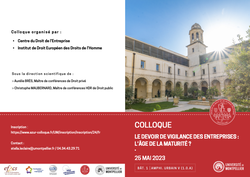
♾️ flollow Marie-Anne Frison-Roche on LinkedIn
♾️subscribe to the Newsletter MAFR Regulation, Compliance, Law
____
► Full Reference: M.-A. Frison-Roche, "Conclusions", in Ch. Maubernard et A. Brès (dir.), Institut de droit européen des droits de l'homme et Centre de droit de l'entreprise, Université de Montpellier, Le devoir de vigilance des entreprises : l'âge de la maturité?("The Entreprises duty of vigilance: the maturity age?") , Montpellier, May 25, 2023.
The conference is held in French.
____
🧮see the manifestation programme (in French)
___
🌐 read the report done on LinkedIn (in French)
___
► English summary of this final speech of the manifestation: It is rather difficult to draw a conclusion after listening so many contributions. For three reasons: firstly, because of their richness and extreme diversity; secondly, because of the fact that we do not know whether the duty of vigilance is under the French law of 2017 (known as the Vigilance Law) or in other national, European and international texts or beyond or below the legal rules; thirdly, because we do not know what is meant by the "maturity" of a legal concept. But in the end, since the question posed by the title itself of the colloquium is Duty of Vigilance: the age of maturity? the answer is clearly: no.
But this is regrettable. It is therefore essential to explore the ways in which the duty of vigilance can mature. If we find merit in this duty which has now entered the legal system, there are eight intersecting avenues, which must be exploited.
The first path is progression through the passage of time, rediscovering what in the past was already vigilance and what in the future will be its deployment.
The second way is to progress by fixing the vocabulary, because we are witnessing a great battle of words, overtly or covertly, in French or English.
The third path is progression through the emergence of principles, or even a principle, rediscovered or invented.
The fourth path is progression through coherence brought to the legal system(s), which at present suffer from gaps and inconsistencies, which could be remedied by methods such as centralising litigation or, more radically, ignoring borders.
The fifth path is progression through the fact that it works, because vigilance techniques are those of Compliance, of which vigilance is the leading edge, and the challenge is to find solutions.
The sixth path is progression through using power of the legal system not only to create new areas of relevance - starting with the notion of vigilance, but also that of the value chain - but also to impose new indifferences, namely indifference to the figure of the market (to which laws prefer the company and the value chain) and indifference to borders.
The seventh path is progression through bringing perspectives closer together, in order to find solutions even when interests are opposed. This is where the two techniques of contract and mediation are very welcome.
The eighth path is progression through culture, because the culture of vigilance, like the culture of compliance, must be developed within companies and supply chains, and must become common to them and their stakeholders.
____
________
March 24, 2023
Conferences
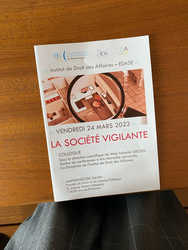
♾️ suivre Marie-Anne Frison-Roche sur LinkedIn
♾️s'abonner à la Newsletter MAFR Regulation, Compliance, Law
____
► Référence complète : M.-A. Frison-Roche, "synthèse", in I. Grossi (dir.), La société vigilante, Université d'Aix-Marseille, Institut de Droit des Affaires, 24 mars 2023.
____
____
🧮Consulter le programme complet de cette manifestation
____
Cette réflexion finale a servi de base à un article ; La vigilance, pièce du puzzle européen. Lire le document de travail sous-jacent.
____
► Présentation de la synthèse : La synthèse du colloque a été réalisée sur le vif, à partir des notes prises au fur et à mesure du déroulement de la journée. L'écoute des uns et des autres a fait ressortir 4 points qu'il aurait été difficile d'isoler dans une partie du droit positif, parce qu'il a été manifeste que les propos ont porté parfois sur la Compliance, parfois sure l'obligation de vigilance, parfois sur le devoir de vigilance et le plus souvent sur la loi du 27 mars 2017, laquelle a donc servi de porte d'entrée à l'ensemble des réflexions. Mais elle n'a été qu'une porte d'entrée.
Le premier point est justement l'impression d'une ampleur de tantôt de "gloire" et tantôt d'"indignité" qui ont été déversées sur cette loi Vigilance. Les intervenants ont donc fortement divergé.
Le deuxième point est l'impression à l'inverse générale et commune, pour que les orateurs s'en félicitent, s'en inquiètent, s'en réjouissent ou s'en effondrent, d'un grand mouvement auquel nous assistons et que la Vigilance traduit ou/et porte.
Le troisième point est la multiplicité des branches du Droit qui sont utilisées ou touchées, là encore qu'on s'en réjouisse ou pas, et la nécessité de dépasser ces branches du Droit. Face à la Vigilance, des disciplines peuvent apparaître en opposition, tandis que des branches du Droit semblent entrer comme en résistance. La majorité des intervenants ont souligné que les branches du Droit, cette loi n'étant alors que l'expression d'un mouvement plus vaste, la Vigilance dépassant la Loi Vigilance, sont activées et transformées. Il en est ainsi du Droit international et du Droit processuel. L'idée étant que la Vigilance pourrait bien être l'expression d'une branche du Droit spécifique et nouvelle : le Droit de la compliance. Au-delà de la compréhension de ce qui se passe, l'enjeu technique est d'articuler les branches du Droit concernées, notamment dans le rapport entre dispositions spéciales et principes, entre Droit spécial et Droit commun.
Le quatrième point est l'absence de définition de la vigilance. L'on en a peu davantage entendu de ce que pourrait être une "entreprise vigilante"...L'existence d'un devoir portant sur une situation précise suffit-elle à transformer toute l'entreprise et que devient-elle alors dans son entier ? Art pratique, le Droit n'aime pas les mystères. Car comment bien manier un instrument juridique dont la définition varie, dont on ne connaît que le régime, lequel varie au gré des réglementations, diverses et changeantes, ? Peut-elle varier selon les secteurs, selon les entreprises, selon les divers contrats qui sont partout ?
Peut-être, en conclusion et comme cela fût évoqué par certains, au-delà de la directive attendue sur la Corporate Sustainability Due Diligence, c'est plus largement dans le puzzle des définitions que le Droit de l'Union européenne est en train de construire, en corrélation avec le reporting extra-financier, que l'on pourra trouver, dans la conception systémique et humaniste portant l'identité européenne, voire sa souveraineté, ce qui donne sens et simplicité à la Vigilance.
____
✏️lire les notes prises sur le vif pour opérer la synthèse
____
📝lire l'article publié suite à cette conférence
________
March 24, 2023
Conferences

♾️ follow Marie-Anne Frison-Roche on LinkedIn
♾️subscribe Newsletter MAFR Regulation, Compliance, Law
____
► Full Reference: M.-A. Frison-Roche, "Propos introductifs : Les buts monumentaux de la vigilance" (Introductory remarks: The Monumental Goals of Vigilance), in La société vigilante ("The Vigilant Company"), Aix-Marseille University, Institut de Droit des Affaires, March 24, 2023.
____
This conference is done in French; read its English Summary below⤵️
🧮see the complete program of the manifestation (in French)
____
► English Summary of the conference: "Vigilance" is intriguing because, although it occurs in many branches of Law and is familiar in "banking compliance", in a form that is moreover reinforced since it is an obligation of vigilance on the part of the banker about a client whom he/she should "know", it is the "duty of vigilance" that made this notion famous. One could almost say scandalously famous because of a French law of 2017 that now bears its name, called the "Vigilance Law", whereas other laws bear the name of the minister who thought of it, which due diligence (vocabulary used for the European directive) does not erase.
The current challenge is to take the right measure of what "vigilance" is.
Vigilance goes beyond the French Loi Vigilance, which is not enough to express what it is in its few dispositions. To say what it is in the legal system, to use it in practice, to propose the intellectuel legal exercice of qualification, Vigilance must be thought of in Compliance Law, of which it is both a "Tool" and the most advanced point, as shown by the European Directive, whose discussions during its elaboration show these design issues.
Thus, like the whole of Compliance Law, Vigilance is understood, deployed, analysed and exercised through what underpins and gives meaning to all these constantly changing regulations, powers, and obligations, through Compliance Monumental Goals which give it stability and simplicity. This is the least that can be done in a mechanism that has the ambition to organise the "sustainability" of economic relations.
But while Vigilance expresses and concretizes Compliance Monumental Goals, it must not go beyond measure.
In fact, to set up structures, use tools and behave in such a way that human rights and nature are effectively and extraterritorially protected, both negatively and positively, these obligations of the company, which is the natural subject of the "duty", more generally the natural subject of Compliance Law, see its legal powers increased, these means being required for the company to fulfil its new obligations, first legal, then contractual, soon to be unilaterally formulated.
Perhaps we should conceive of a "vigilant company" and not just a company that, beyond and through its economic activity, cares for others and the world, but a company that "watches over" everything and on everything would be to go beyond the measure, to make companies the "regents" of the world and the people who live in it.
Faced with this perspective to be excluded, the construction of a Europe of Compliance, which does not be reduced to corruption fighting or environment protection, and draws on its humanist tradition, distinguishing itself in this respect from the American and Chinese compliance systems, is the major challenge.
Companies are not the alpha and omega, but they are one of the elements of an Alliance between the political Authorities and the population, its link, the one that allows us to escape from the limit of the territory, in what we call by this inadequate term of "extraterritoriality". It is rather a question of going beyond territories, required by the Compliance Monumental Goals of Compliance, of which Vigilance is the advanced point.
____
🚧read the English Working Paper, basis of this conference: "Vigilance, Compliance Monumental Goals, and "Vigilant Company""
____
📈see the slides created for this conference (in French)
____
📝read the article published after this conference
________
Sept. 27, 2022
Hearings by a Committee or Public organisation
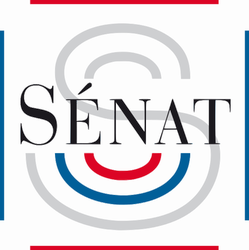
🌐suivre Marie-Anne Frison-Roche sur LinkedIn
🌐s'abonner à la Newsletter MAFR Regulation, Compliance, Law
____
► Référence complète : M.-A. Frison-Roche, audition par la Commission des Lois du Sénat sur la Proposition de Loi constitutionnelle relative à l'interruption volontaire de grossesse et à la contraception, 27 septembre 2022.
____
► Lire le dossier législatif, notamment l'exposé des motifs de la proposition de loi.
____
►Résumé de la présentation avant la discussion : ma contribution à la discussion nourrie et très large établie entre les représentants du Sénat et les administratrices et mes collègues, Elisabeth Zoller, Stéphane Mouton et Sophie Paricard, a plutôt consisté à développer la dimension concrète et pratique du sujet et la considération que celle-ci a sur la rédaction d'un texte, s'il venait à l'idée du Législateur de s'en saisir.
En effet, il s'agit non pas tant d'établir un droit subjectif, dont la dimension constitutionnelle en tant que telle peut poser techniquement problème, mais d'assurer son effectivité. Ce terme-même d'effectivité est utilisé par la proposition de loi. Or, la notion d'effectivité est utilisée dans le Droit économique, qui vise les buts, le Droit de la Régulation et de la Compliance visant à obtenir dans une sorte de réussite croissante l'effectivité, l'efficacité et l'efficience des mécanismes juridiques. Mais ce souci de politique publique est difficile à intégrer dans le système juridique, et ce que fait le Droit de la Régulation et de la Compliance est difficile à concevoir au niveau constitutionnel, la notion d' "accès à un droit" étant sans doute un pléonasme par rapport à la notion de "droit à l'effectivité", lequel vise sans doute les différents sujets de droit qui, dans la chaîne concrète qui jalonne la façon dont une femme dispose de son corps, deviendrait débiteurs d'un tel "droit d'accès à un droit".
Une telle notion peut engendrer de nombreux contentieux car les potentiels débiteurs d'un tel droit subjectif, qui aurait valeur constitutionnelle, ont aussi des droits subjectifs à opposer, et c'est une grande agressivité juridictionnelle des uns et des autres, des uns contre les autres, qui peut être ainsi engendrée.
D'ailleurs, placer dans la Constitution un tel droit subjectif sous "De l'autorité judiciaire" est inapproprié car le droit à l'avortement est protégé également par le juge administratif, non seulement à travers le contrôle objectif des textes mais encore à travers le contentieux subjectif, les établissements publics étant fortement impliqués dans sa mise en oeuvre.
En outre, de la même façon que l'arrêt Dobbs v. Jackson est un arrêt systémique, visant le fédéralisme, qui en application de la conception par la Cour de celui-ci peut et va priver d'autres droits subjectifs de leur protection constitutionnelle fédérale, le premier à tomber étant sans doute le droit des personnes de même sexe à se marier, mais d'autres peuvent venir, le Constituant français devrait d'ores et déjà (puisqu'il vise l'avenir) soit :
- viser une catégorie plus abstraite de droits subjectifs que le droit à l'avortement, en visant une catégorie . Mais comment délimiter cette catégorie ? comment le dire ?
- soit partir dans le système de liste (ce qui explique l'insertion dans l'article 16, qui met ce droit spécifique à l'avortement parmi une liste d'autres droits, et suppose donc qu'à chaque fois l'on prenne une autre loi pour mettre les autres ...
Cela suppose alors que le Législateur intervenir par à-coup, dans une liste que le juge aura bien du mal à interpréter, sans doute une "liste fermée"..., mais surtout intervienne en Ex-Post, à chaque fois qu'il pense qu'une agression est davantage probable sur un droit que sur un autre (car c'est le raisonnement ici suivi, l'arrêt Dobbs, qui ne concerne pas l'Europe, étant considéré par le Législateur français comme un "signal" de danger sur ce droit-là...) : mais le Législateur d'une part doit intervenir sur l'avenir et non pas sur le passé (les lois "en réaction" ne sont pas de bonne méthode) et doit être abstraites car c'est au juge de décliner sur des situations et droits particuliers (cf. Carbonnier et "l'effet macédonier"). Or, le Conseil constitutionnel n'est pas placé pour faire cela. Quel juge en France pourrait le faire ?
Malgré la bonne intention du Législateur, et en retournant les techniques juridiques dans tous les sens, l'on ne voit pas "quoi faire"...
Mais, puisque l'enjeu n'est pas tant l'existence d'un droit, mais l'effectivité de celui-ci, et l'efficacité d'un système médical et social à le servir dans la "réalité" des choses, pourquoi ne pas se tourner vers le Droit économique, Droit concret et téléologique par excellence ?
Dès lors, si le Législateur devait intervenir pour protéger davantage à l'avenir l'effectivité du droit des femmes à disposer de leur corps, c'est peut-être sous une forme plus incitative, en s'appuyant sur les entreprises qui, comme l'ont fait les entreprises américaines en aidant les femmes à voyager jusqu'aux Etats protecteurs, en ne communiquant pas des informations aux autorités publiques des Etats non-protecteurs, aident concrètement à l'effectivité des droits subjectifs qui sont concrètement menacés, maintenant aux Etats-Unis, éventuellement demain en Europe et en France.
Cela s'appuie sur le Droit de la Compliance.
____
Voir aussi
💬Frison-Roche, M.-A, "La Cour suprême a déclenché la bombe de la sécession. Que faire ?", 5 juillet 2022
💬Frison-Roche, M.-A, Droit à l’avortement : « Le processus de sécession est dans la décision », 27 juin 2022
📧M.-A. Frison-Roche, Seuls les droits subjectifs techniques ne sont pas touchés par l'arrêt Dobbs: c'est sur eux qu'il faut construire une nouvelle théorie de l'entreprise, 29 juin 2022
Nov. 27, 2021
Conferences

► Full Reference: Frison-Roche, M.-A., Chair for "The temporal dimension: Imminence and Intertemporally", in Climate Change Cases before National and International Courts Cross-fertilization and Convergence", November 27, 2021, Paris.
____
Summary of the panel presentation: The specific topic of our panel is the “temporal dimension” of the judicial cases of Climate change.
We shall listen to two great experts on this topic, which is Time.
Listening the other previous speakers, I understand how this topic is important, because Climate Change requires an immediate action and it create a political issue, because everyone comes before courts.
A basis and fundamental problem, because the times are not adjusted.
let's come back to basic notions, to have three times : “past, present, future”.
The issue of Climate Change is in the Future, the necessity of Action is in the Present and the basis temporal question is to know if Courts are the bodies adequate to responde ; maybe it is inevitable that Judge must be recreate their office because the time of the classical judicial office is the Past.
Immediately, this simple et huge problem appears : in a classical repartition, the judge is the legal character to intervenir for the Past, the present (maybe is for you and me), and the future is the time for the State, and more precisely for the Parliament.
But the climate change is a huge topic, not in the past, not in the present, but in the future.
Therefore a gap exists between the time of the topic and the time of the court before the case is explained for obtaining a solution : how to give a good answer ? Judge maybe must travel in time, from past to future …. Maybe, he must, but might he?
Classically, the judge can anticipate a very next future, but not the more distant and systemic future. Climate change belongs to the second one.
This is why the title of this panel is non only about the necessity to take in consideration the “imminence” but also the “intertemporally” : maybe court are the sole able to create this intertemporality between Past and Future, and by this way to obtain from States and companies to do something immediately !
By two legal ways.
Courts can stay in Past, supervising States, if they dispose of effective legal decisions taken by States in the past about Climate Change (essentially Paris Agreement, for instance transposed in the French legal system by a formal law). This is why an efficient judicial solution would be the possibility for the courts to oblige State to implement their more or less committment they had taken in the past for the future (as the Conseil d’Etat did in the Commune de Grande-Synthe Cas Law).
Even for that, the courts must adopt a creative notion of what is a commitment from a State through a Law... ; as they must do about private companies comitment (in their codes of conduct or soft law of corporate social responsability).
But what to do if States didn’t take such commitment ?
Some can allege Courts are not Parliaments and are not legitimate to rule for the future … It is a political issue, a very classical one but very accurate for Climate change (where States and companies are face to courts...) and maybe And as our colleague said, judicial system is quite technically weak to concretize human rights.
Therefore, the second way, more innovative, est the new use of Tort Law : no more a liability Ex Post, but a responsibility Ex Ante. In every legal system, even in Civil Law systems, Tort Law is conceived by courts (for instance in French Law).
If the new reasoning is conveived in Ex Ante, Tort Law must be a set of legal tools to reach the monumental tools to reach the "Monumental Goal" (being by nature future) which is the Climate Change stopping.
In this teleological reasoning, the admissibility and the choice remedies, must be adapted to obtain what is central : the effectivity and the efficiencicy.
In this sens, the judgement between two parties (which was an Ex Post act) may be conceived as an systemic efficient action (which was an Ex Ante act), because it must be.
_____
Nov. 4, 2021
Conferences
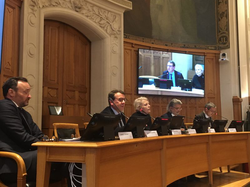
 ► Référence complète: Frison-Roche, M.A., Appréciation du lancement d'alerte et de l'obligation de vigilance au regard de la compétitivité internationale (" ("Assessment of Whistleblowing and Vigilance Duty with regard to international competitiveness"), in Benzoni, L., Deffains, B. et Frison-Roche, M.-A.(dir.) , Effectivité de la Compliance et Compétitivité internationale("Compliance Effectivity and International Competitiveness"), seminar co-organised by the Journal of Regulation & Compliance (JoRC) and the Centre de recherche sur l'Économie et le Droit (CRED) of the Panthéon-Assas University, November 4, 2021.
► Référence complète: Frison-Roche, M.A., Appréciation du lancement d'alerte et de l'obligation de vigilance au regard de la compétitivité internationale (" ("Assessment of Whistleblowing and Vigilance Duty with regard to international competitiveness"), in Benzoni, L., Deffains, B. et Frison-Roche, M.-A.(dir.) , Effectivité de la Compliance et Compétitivité internationale("Compliance Effectivity and International Competitiveness"), seminar co-organised by the Journal of Regulation & Compliance (JoRC) and the Centre de recherche sur l'Économie et le Droit (CRED) of the Panthéon-Assas University, November 4, 2021.
____
►This intervention is thematic ; it is articulated with those more general carried out in introduction by Bruno Deffains particularly focused on the necessarily global scope of Compliance and in conclusion by Laurent Benzoni on Compliance as a potential new pillar of industrial policy, the whole of the colloquium having been conceived by the three of us.
____
📅 this scientific event is part of the 2021 colloquia cycle, organized by the Journal of Regulation & Compliance (JoRC) and its Universities partners, on the general theme of Compliance Monumental Goals.
____
🚧 read the bilingual Working Paper, basis of this conference
____
►see the slides used during the conference
____
► Conference Summary: First of all and independently of the technical topic itself which, as the slides show, is focused on these two techniques based on Information which are the Whistleblowing and the Vigilance duty, it is essentiel to pose that the techniques themselves are conceived totally differently depending on whether Compliance Law is conceived as a mechanical process and totally binding to fully comply with all applicable regulations and to demonstrate it in advance, under the threat of terrible fines, this definition being the both completely frightening and meaningless since what these applicable regulations contains is irrelevant, in which case the prospect of competitiveness boils down to notions of costs and also procedural considerations of foreseeability and legal certainty; or if Compliance Law is conceived as a new and substantial branch of Law Ex Ante developed to detect and prevent the systemic crises being before us, of which the climate crisis is unfortunately the epigone and which requires above all Action, an action of such magnitude which requires the alliance of all forces, that of States, companies, courts and people, in a renewal of concepts, particularly legal ones, and in the indifference of territories, which puts Compliance immediately at its right level: the world, because the scientifically emerging crisis is global, the so-called "extraterritoriality" theme now being misnamed. From this new general conception, the Vigilance obligation, about which so much was said when it was imposed in France in 2017, is the advanced point, soon taken up in Europe and whose scope must be naturally global, because that Compliance Law is consubstantially global.
Taking up more technically the legal techniques of Compliance and confronting them with the Competitiveness of firms, it is necessary that these Compliance Tools do not harm this Competitiveness because Compliance Law , supporting immense ambitions, can only function through an alliance between political wills (with great pretensions, i.e. save the planet) and the entities which are able to concretize them (the crucial economic operators): the Compliance tools designed by legal systems must preserve the companies which put them in place and never favor their competitors.
On the basis of this principle, it is possible to assess these two legal techniques, namely the whistleblowing and the Vigilance duty, which both capture Information, which, as such, gives them a uniqueness and places them in the global Competition for Information.
Taking the whistleblowing first, it appears that its first beneficiary is the company itself since it discovers a weakness and can therefore remedy it. This is why, beyond the principle of protection of the whistleblower by the access of somebody to the legal statute conceived in France by the law known as "Sapin 2", it is criticized that all the incentives are not used for that the holder of such information transmits it to the manager and that the same law continues to require the absence of financial counterpart, the "heroic figure of the whistleblower and the refusal of his remuneration depriving the company of a means information and improvement. The American solution is better and tt is regrettable that the law transposing the European Directive maintains this ineffective conception. But French legislation has on the contrary developed the right incentive as to the person whom the information must be transmitted to is the manager, then externally if the latter does nothing. The solution is better that the American solution because the incentive is thus made to push the internal manager to act and put an remedy to the internal dysfunction, which increases the competitiveness of the company.
Even more, even if it seems counter-intuitive, the French Vigilance Duty greatly increases the competitiveness of the companies which are subject to it. Indeed, the 2017 Law by obliging them to prevent and fight against human rights and environment violations has tacitly given them all the necessary powers to do so, in particular the power to capture Information on third-party companies, including ( and even above all) those which are not subject to transparency obligations. In this, companies, insofar as they are personally responsible, hold a supervisory power over others, a power which allows Compliance Law to globalize and which, in the process, increases their own power. This is why the obligation of vigilance is in many respects a boon for the companies which are subject to it. The resumption of the mechanism by the next European Directive, itself indifferent to the territory, will only strengthen this global power on other firms, even foreign ones.
____
► This conférence et le document de travail servent de base à un article dans un ouvrage :
📝This conference and the Working Paper constitute the basis for an article:
📕 in its French version in the book Les buts monumentaux de la Compliance, in the Series 
📘 in its English version in the book Compliance Monumental Goals, in the Series 
_________
June 23, 2021
Conferences
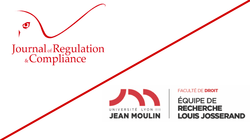
 Full reference: Frison-Roche, M.-A., The judge-judged: Articulate words and things face to the difficult conflicts of interest, in L'entreprise instituée Procureur et Juge d'elle-même par le Droit de la Compliance, colloquium co-organized by the Journal of Regulation & Compliance (JoRC) and Lyon 3 Law School, 23rd of June 2021.
Full reference: Frison-Roche, M.-A., The judge-judged: Articulate words and things face to the difficult conflicts of interest, in L'entreprise instituée Procureur et Juge d'elle-même par le Droit de la Compliance, colloquium co-organized by the Journal of Regulation & Compliance (JoRC) and Lyon 3 Law School, 23rd of June 2021.
____
This conference was in French ; the Working Paper on which this conference was based is in French and in English: The judge-judged: Articulate words and things face to the stressful conflicts of interest
📅 June 23, 2021, 9h30 - 18h30
🧭 Lyon, Lyon 3 Law School, "Salle de la Rotonde" and online
____
📊 Read the slides on which this conference is based (in French)
🎥 See the video of this conference.
📝 Read the general program of this colloquium (in French)
📝 Read the working paper on which this conference is based (in English)
___
📅 This colloquium is part of the cycle of colloquia in 2021 organized by the Journal of Regulation & Compliance (JoRC) and its partners about Compliance Juridictionnalization.
📕 📘 The conference is the first basis for the writing of an article, forthcoming in a book whose the French version is La juridictionnalisation de la Compliance, co-published by the Journal of Regulation & Compliance (JoRC and Dalloz, and whose the English version Compliance Juridictionnalisation, is co-published by the Journal of Regulation & Compliance (JoRC) and Bruylant.

____
🔻 Summary of the conference: read below.
March 31, 2021
Conferences

 Full reference: Frison-Roche, M.-A., Compliance et arbitrage. Rapport de synthèse: un adossement (Compliance and Arbitration: a Backing. Conclusion), in Frison-Roche, M.-A. & Racine, J.-B., Compliance et Arbitrage (Compliance and Arbitration), Colloquium co-organised by the Journal of Regulation & Compliance (JoRC) and the Centre de recherches sur la Justice et le Règlement des Conflits (CRJ) of Panthéon-Assas University (Paris II), with the support avec the International Court of Arbitration, Paris, 31st of March 2021
Full reference: Frison-Roche, M.-A., Compliance et arbitrage. Rapport de synthèse: un adossement (Compliance and Arbitration: a Backing. Conclusion), in Frison-Roche, M.-A. & Racine, J.-B., Compliance et Arbitrage (Compliance and Arbitration), Colloquium co-organised by the Journal of Regulation & Compliance (JoRC) and the Centre de recherches sur la Justice et le Règlement des Conflits (CRJ) of Panthéon-Assas University (Paris II), with the support avec the International Court of Arbitration, Paris, 31st of March 2021
_____
Read the program of this colloquium
See Marie-Anne Frison-Roche's conclusion in video (in French, with English subtitles)
These notes of the conclusion have been written as the colloquium took place.
See the video of the entire colloquium (in French, with English subtitles)
___
This colloquium is part of the Cycle of colloquium 2021 organized by the Journal of Regulation & Compliance (JoRC) and its partners around the topic Compliance Juridictionnalization.
This manifestation is in French but the interventions will be the basis for a specific chapter of the English collective book directed by Marie-Anne Frison-Roche, Compliance Juridictionnalization, co-published by the JoRC and Bruylant.
An equivalent book in French, La Juridictionnalisation de la Compliance, directed by Marie-Anne Frison-Roche, will be co-published by the JoRC and Dalloz.
Read the notes established for the conclusion below ⤵️
Dec. 31, 2020
Thesaurus : Doctrine
Full reference: Zittrain, J. L., "Gaining Power, Losing Control", Clare Hall Tanner Lecture 2020, 2020
Read the intervention's report
This intervention is divided in two parts:
- Between Abdication and Suffocation: Three Eras of Governing Digital Platforms
- With Great Power Comes Great Ignorance: What’s Wrong When Machine Learning Gets It Right
Jan. 23, 2020
Thesaurus : Doctrine

► Référence complète : W. Marx, "Vivre dans la bibliothèque du monde", Leçon inaugurale pour la Chaire de Littérature comparé au Collège de France, 23 janvier 2020.
____
📻Ecouter un entretien à propos de ce cours, centré sur la notion de "bibliothèque mentale" :
____
► Présentation de la conférence (faite par le Collège de France) : L’étude de la littérature est affaire de science, mais aussi, et sans doute d’abord, de plaisir. Or le plaisir peut faire obstacle à une approche scientifique de la littérature. Heureusement, une étude comparée de la littérature permet de dépayser notre rapport à la littérature en remettant en question nos habitudes de lecture ainsi que les canons sur lesquels se fonde notre conception de l’objet littéraire. Elle permet de renouveler notre compréhension des œuvres, dans la mesure où toute lecture est, de manière inconsciente, une lecture comparée : une œuvre fait sens sur un fond d’autres œuvres dont elle se détache, tant et si bien que changer l’arrière-plan revient également à modifier la perception du premier plan. Un tel décentrement n’est cependant pas facile à obtenir : il exige une transformation quasiment existentielle du lecteur lui-même, appelé à renoncer à l’idée beaucoup trop nivelante de littérature mondiale, pur produit de l’émergence du concept moderne de littérature à la fin du XVIIIe siècle, afin de parvenir à entrer dans un autre univers, celui de la bibliothèque du monde, infiniment plus respectueuse de la singularité des objets qui la composent, et donc plus propre à provoquer la défamiliarisation indispensable. Une approche comparatiste doit se frayer un chemin étroit entre, d’une part, cette nécessaire sensibilité à l’altérité et, d’autre part, les forces aujourd’hui toujours plus puissantes qui visent à rendre les cultures hermétiques les unes aux autres en insistant sur une prétendue incommunicabilité des objets culturels.
.....
À quelle échelle en effet envisager un problème quelconque de l’histoire littéraire ? L’échelle européenne vaut pour un grand nombre de sujets intéressant la littérature française. Mais de quelle Europe s’agira-t-il ? Une définition large s’impose, intégrant les littératures des langues européennes, de quelque continent qu’elles viennent, et notamment des Amériques. Mais pourquoi s’arrêter là ? Dès l’Antiquité classique, les échanges méditerranéens et eurasiens mirent en contact les cultures européennes avec l’Afrique et l’Asie, et ils ne cessèrent de se complexifier, en particulier avec les mouvements de colonisation, puis de décolonisation. La perméabilité des cultures et la circulation des œuvres forment une donnée fondamentale de leur histoire.
La notion même de littérature fait cependant problème, avec tout ce qu’elle implique de présupposés et d’usages historiquement datés et géographiquement localisés : en gros, l’Europe des deux derniers siècles. C’est pourquoi l’intitulé de cette chaire a été mis au pluriel, et il y est proposé l’étude non pas de la, mais des littératures, dont il convient de postuler d’abord la diversité, non seulement linguistique, mais culturelle et anthropologique. Il s’agira d’explorer une problématique, celle de la pluralité des objets dits littéraires, de leur nature, des corpus qu’ils forment, de leurs fonctions et de leur variabilité historique et culturelle.
En travaillant à une histoire et à une géographie différentielles du concept de littérature, on visera à provoquer chez le lecteur contemporain un sentiment d’étrangeté par rapport à lui-même, à déstabiliser ses systèmes de valeurs et sa vision du monde : non pas le simple dépaysement pour le dépaysement, mais un dépaysement visant à la défamiliarisation.
Une telle réflexion sur les cultures dans lesquelles s’inscrivent les textes finit forcément par déboucher sur une critique générale de la culture, selon une mission de nature humaniste et démocratique. Dans l’Europe à laquelle nous participons désormais en tant que citoyens, dans le monde globalisé qui est le nôtre, où les progrès technologiques démultiplient les échanges et circulations des personnes, des discours, des représentations et des biens tout en aggravant le risque de malentendus culturels et religieux, cette mission subversive, critique et créatrice ne peut pas ne pas rester la note fondamentale, sinon la justification, de tout enseignement et de toute recherche en littératures comparées au Collège de France.
________
Nov. 21, 2019
Conferences
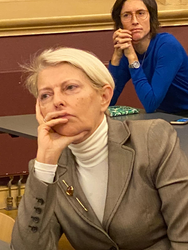
Référence complète : contribution à l'organisation et à la tenue de la conférence de présentation de l'Association Henri Capitant, Faculté de Droit d'Oslo, centre de droit privé, 21 novembre 2019.
Par cette conférence de présentation et la discussion qui s'en est suivie avec les juristes réunis à l'initiative du professeur Mads Andenas, professeur de droit à la Faculté de Droit d'Oslo, les bases ont été posées de la constitution d'un Groupe norvégien de l'Association Henri Capitant.
April 8, 2019
Conferences

Cette participation à la table-ronde présidée par Andrea Enria, chairman du Supervisory Board du Single Supervisory Mecanism de la Banque Centrale Européenne qui a pour thème Competition and Regulation in the financial sector.
Elle-même fait partie d'une journée ayant pour thème Competition in a globalised world: the role of public policies, organisée dans le cadre du G7 France 2019 par la Banque de France et le Ministère de l'économie et des finances.
La conférence et les supports sont en anglais.
Dans la table-ronde, il m'est plus particulièrement demandé d'abord la question de la méthodologie à adopte dans le secteur financier, en raison des nouveaux acteurs digitaux, et des principes à adopter à propos des datas.
Nov. 13, 2018
Thesaurus : Doctrine
Discours d'Emmanuel Macron, président de la République, au Forum "Gouvernance Internet", Unesco, 13 novembre 2018.
Lire le Discours. Compl
May 31, 2018
Conferences

Référence générale : Frison-Roche, M.-A., La garde de l'unité de la personne dans un système a-moral, in Cour de cassation & Association française de philosophie du Droit, Droit & Ethique 31 mai 2018, Paris.
Lire le programme disponible sur le site de la Cour de cassation.
Lire une présentation générale du colloque.
Lire une présentation des observations finales par ailleurs présentée..
Résumé de la contribution : Le Droit a pour fonction de protéger l'être humain. Si l'on confronte la situation concrète des être humains et la puissance du Droit (I), le Droit peut donner une unité à l'être humain, unité qu'il n'a pas ni par nature ni par la société, par l'invention juridique de la personnalité (I.A). Mais le Droit est aujourd'hui lui-même tenté de pulvériser l'unité de la personne, notamment à travers le "Droit des données" et le "Droit des prestations corporelles", ce dont la GPA est le bastion avancé (I.B). L'on songe alors à requérir la souveraineté éthique du Droit (II) Pourquoi ? Parce qu'il y a urgence à maintenir l'unité de la personne humaine grâce au Droit, en raison de l'a-moralité d'un monde sans limite, gouverné par la rencontre livre des désirs (II.A) en retenant l'hypothèse d'un droit "de principe" (II.B), d'un Droit qui peut exprimer les principes éthiques garantissant à l'être humain d'être pas la matière première de marchés de l'humain qui se construisent sous nos yeux (II.C).
Faute de temps, cette contribution n'a pas pu être présentée.
Lire le document de travail sur la base duquel la conférence a été élaborée.
Ce travail sera utilisé pour l'élaboration d'un article à paraître aux Archives de Philosophie du Droit
Sept. 14, 2017
Conferences

Référence complète : Frison-Roche, M.-A., Forces et enjeux des principes coopératifs -perspectives internationales, in "Planète coopérative" , 14 septembre 2017, Maison de la Chimie.
Lire une présentation générale de la manifestation.
Consulter les slides servant de support à la conférence.
Nous vivons avec des "modèles" en tête. L'éparpillement du Droit en réglementations innombrables et en prérogatives multiples masque cet élément essentiel, que le détachement que procure la perspective internationale permet de mieux percevoir. Ainsi, ce que nous avons comme modèle en tête, tous, non seulement comme entreprise, mais encore comme gouvernant ou comme personne privée, c'est le "marché". Au point qu'Alain Supiot a pu à juste titre montrer que nous vivions désormais sous l'idée agissante du "Marché total", la majuscule étant le signe d'une défaite pour les autres idées devenant vassales, ne pouvant exister que si elles trouvent une justification pour exister encore par rapport à l'idée-mère qu'est le Marché.
C'est ainsi : les Idées mènent le monde.
C'est pourquoi les règles qui expriment autre chose que le marché, nous ne les voyons pas, nous ne les "supportons" qu'à peine, aussi bien au sens français qu'au sens anglais de ce terme.
Or, le Marché, c'est l'idée d'une lutte à mort (la faillite) dont il sortira un bienfait (le marché "nettoyé", l'entreprise la plus adéquate survivant pour toujours plus de richesse et d'innovation), le vice individuel produisant la vertu générale, car Adam Smith était avant tout un moraliste. Puis, Schumpeter expliqua que de cette destruction naissait du nouveau. Ainsi, tout marche bien, pas besoin d'intervention de l'être humain : le Marché est l'espace auto-régulé par excellence. Ainsi, dès que des êtres humains apparaissent, que leurs volontés propres se manifestent, autrement que par leur appétit de gain, le Droit de la concurrence y pose une présomption simple de comportement malicieusement destructeur des bienfaits destructeurs de l'immense machine à calculer et à produire de la richesse d'être le Marché.
Gardons en tête que nous partons de l'idée que le "principe" est l'économie de la guerre de tout instant entre agents, ce qui produit sur le moyen et long terme le bonheur de tous, l'organisation plus conviviale et dans la durée de "l'économie sociale et solidaire" étant donc une "exception". En Politique comme en Droit, être dans le "principe" ou être dans "l'exception", cela n'est pas du tout pareil, parce que lorsqu'on est dans le principe, l'on n'a pas à se justifier, tandis que lorsqu'on est dans l'exception, il faut se justifier, tout mouvement est interprété strictement.
Mais cette "idée" du Marché (comme guerre de tous les instants) comme principe et de l'action ensemble sur le long terme comme exception, est-ce que cela correspond à l'évolution technique des textes généraux ?
Non.
Cela correspond à l'idée que l'on s'en fait, à ce que l'on apprend aux enfants à l'école. Cela ne correspond pas à la réalité.
En effet, les principes ont migré d'un principe de concurrence à un principe de "régulation", qui exprime dans tous les secteurs déterminants pour l'économie une solidarité dans le long terme. Non pas tant par humanisme, pas parce que cela est vital pour l'économie. En cela, les entreprises qui sont elles-mêmes structurées en "coopératives" ne sont pas des "exceptions légitimes" mais sont comme des "reflets" de ce qui est aujourd'hui, dans une économie dont la marque est avant le risque et le souci du temps, la nécessité de supporter les chocs et d'anticiper les crises. Or, si on lit les 7 principes coopératifs, ils visent surtout la structure interne et de gouvernance au sein de celle-ci. Mais si on la perçoit comme étant plus poreuse au marché général, on mesure que celui-ci dans son droit général ouvert à ce type de structure et cela pour une raison simple : il est aujourd'hui en train d'être repensé à travers la notion de "crise" et de "risque".
Pour cela, l'idée de marché est en train d'évolution. Elle se reconstitue non plus autour de la notion de "prix" que sert la notion d'information liée au prix mais autour de la notion d'information élargie à un ensemble d'éléments corrélés qui dépassent la notion de prix et embrassent le long terme, tandis que la notion de responsabilité devient centrale. En cela, les notions de confiance, d'information et de responsabilité, au cœur des marchés financier, qui étaient des marchés exceptionnels et régulés, deviennent les notions centrales des marchés ordinaires mondialisés. Or, ce sont ces notions-là qui structurent les entreprises coopératives. En cela, elles sont le bastion avancée du Droit des marchés ordinaires.
Sept. 6, 2017
Interviews

Référence complète : M.-A. Frison-Roche, interrogée par A. Coignard, in "La gestation pour autrui, une question de droit, un enjeu de société", D. Actualités, 6 septembre 2017.
Lire l'article dans lequel est inséré l'entretien.
L'auteur retrace l'évolution de la jurisprudence française et européenne en matière de GPA.
Elle prend pour point d'appui les arrêts de la première chambre civile de la Cour de cassation du 5 juillet 2017 qui, appliquant le droit commun de la filiation, valide l'adoption par le conjoint d'un père de l'enfant de celui-ci, le fait que le lien de filiation entre ce père et son enfant ait été le résultat d'une GPA réalisée à l'étranger ne pouvant enrayer l'application du droit commun de l'adoption.
L'auteur a également interrogé l'avocat des demandeurs, qui voulait que cette filiation entre le conjoint et l'enfant soit reconnue au titre de "l'intention" et non du mécanisme classique et ordinaire de l'adoption, a interrogé Sylviane Agacinski et a détaillé l'avis rendu le 27 juin 2017 par le Comité d'Ethique, qui demande une action internationale de la France pour porter l'effectivité de l'interdiction de la GPA au niveau international.
July 6, 2017
Conferences

Référence générale : Frison-Roche, M.-A., D'où vient la compliance ? ; Où va la compliance : la nécessité de construire un véritable Droit de la compliance, in Cour de cassation et École Nationale de la Magistrature, La compliance, la place du droit, la place du magistrat, Grand'chambre de la Cour de cassation, 6 juillet 2017.
Lire l'intégralité du programme.
Accéder au programme sur le site de la Cour de cassation. , permettant l'inscription au colloque.
Un ouvrage à venir prendra appui sur les travaux de ce colloque.
_____
D'où vient la Compliance ?
Lorsqu'on lit les différents travaux afférents à la Compliance, l'on a parfois une impression étrange : si l'on a du mal à comprendre les mécanismes de Compliance, si l'on en vient à dire que l'on ne peut le comprendre qu'au cas par cas, cela tient au fait que la Compliance change d'aspect suivant qu'on est à une époque ou à une autre, dans un continent ou dans un autre, dans une branche du droit ou dans une autre, dans une entreprise ou dans une autre.
A chaque fois, l'on a l'impression de respirer un air différent, de la violence la plus forte exprimée par les États-Unis, comme le fait le FTCA pour la corruption ; mais l'on parlera encore de compliance lorsqu'une entreprise décide d'édicter une charte éthique au nom de sa capacité autorégulatrice. Et l'on ne comprend pas comment est-ce que cela pourrait constituer un ensemble cohérent, si les différentes personnes ne parlent pas la même langue. Cette impression de cacophonie ne semble que s'accroître, chacun semblant se "spécialiser" dans une des voies, sans qu'aucune harmonie ne se dégage.
Si l'on reprend d'une façon plus historique l'évolution, il apparaît que les mécanismes de Compliance ont 4 origines. Quatre origines qui n'ont pas de rapport les unes avec les autres. Qui ont produit chacune des effets techniques propres, qui perdurent et se superposent. Comment effectivement ne pas en être abasourdi ? Après cette première impression, il faut "dénouer les fils", reconstituer les 4 corpus à la fois cohérents, fondés qui se rattachent d'une façon autonome à chacune des 4 origines.
En effet, la première origine est celle des crises financières américaines, dont la naissance est logée dans la première partie du 20ième siècle dans le dysfonctionnement interne des opérateurs systémiques bancaires qui tiennent les marchés financiers, ce qui a entraîné le pays dans la crise générale. Cela a produit un premier corpus.
La deuxième origine tient en Europe après la seconde guerre mondiale dans l'idée que le Droit doit régner et que toute entreprise doit, à propos de toute règle de Droit, donner à voir en Ex Ante qu'elle le respecte. Cette passion du Droit fait passer l'Ex post du Droit (sanction des violations) en Ex Ante (manifestation du respect), certaines entreprises pouvant y avoir intérêt pour montrer leur amour du Droit et de la Vertu. Cela a produit un deuxième corpus, notamment en Droit de la concurrence.
La troisième origine intervient dans les années 1990 dans le constat fait par les États de leur propre faiblesse et de la puissance d'entreprises globales, en internalisant en leur sein des "buts monumentaux", ce mouvement étant la réponse des autorités publiques au phénomène de mondialisation. Cela ne concerne que les entreprises globales.
La quatrième origine est dans la volonté exprimée par un entreprise, qui peut être concernée par les trois premiers mouvements mais ne l'être pas, de se soucier d'autre chose que la réalisation de profit, cette prise en charge d'autrui, même lointain, faisant se rejoindre la Compliance et la Responsabilité sociale des entreprises.
Consulter les slides servant de base à l'intervention.
_____
Où va la Compliance ?
s